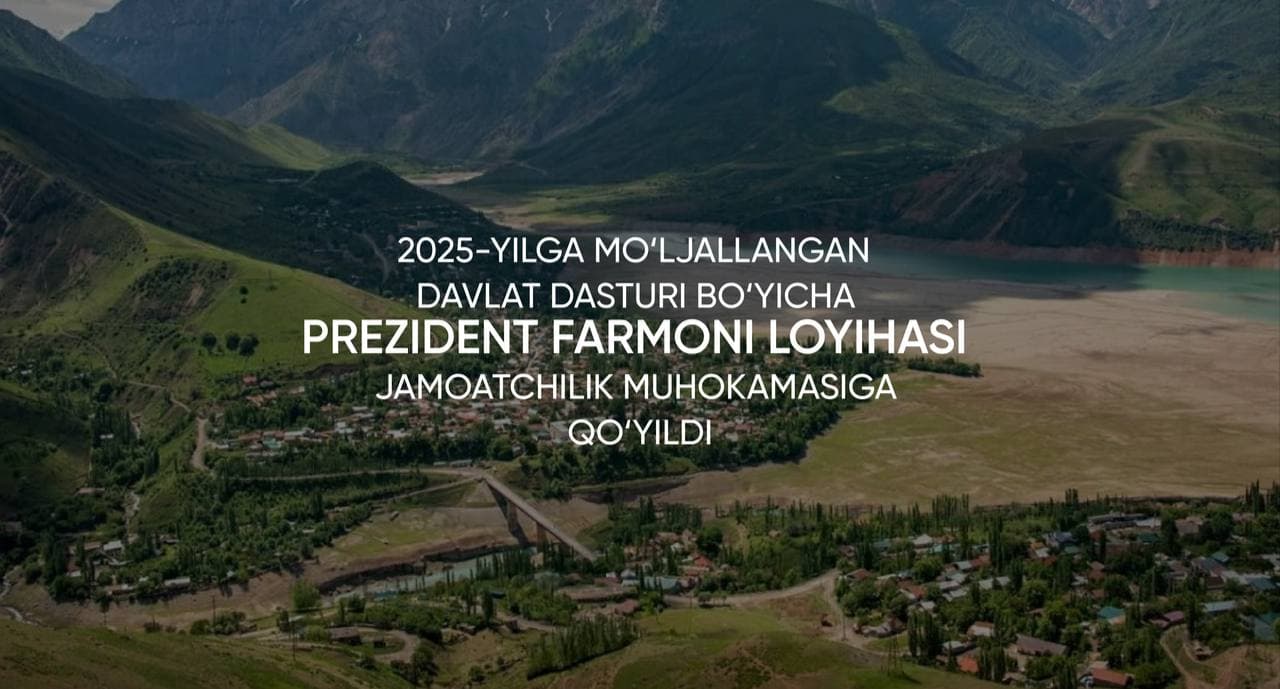Draft of the Presidential Decree on the State Program-2025 Open for Public Discussion
2025-01-09 10:00:00 / News

It should be noted that, in recent years, public opinion—particularly that of young eco-activists—has been prioritized in the field of environmental protection. Significant attention is being given to youth perspectives on nature conservation. In particular, events such as the International Youth Congress were organized, an International Youth Eco-Camp was held in collaboration with the International Public Fund "Zamin", and meetings with the youth were also conducted. During these events, young people share their proposals and opinions on addressing pressing environmental issues. This project was developed based on the collected proposals, public interests, the tasks outlined in the “Uzbekistan-2030” strategy, and international experience.
The project aims to improve the ecological state of neighborhoods (mahallas), increase street greening, create an environmentally friendly and favorable living environment, enhance public health, and promote an ecological lifestyle while realizing human potential. It also focuses on the careful and rational use of natural resources, ensuring ecological sustainability, conserving biodiversity for future generations, and sustainably financing projects to integrate green economy principles, adapt the economy to climate change, and increase the share of renewable energy in the national energy balance. This includes building large-scale green power plants through public-private partnerships, expanding the network of small and micro-hydropower plants in regions, promoting the installation of solar panels in households, and reducing the carbon footprint of the economy by widely adopting modern energy-saving technologies across economic sectors and the social sphere.
Provisions of the Draft Decree Include:
-Developing a long-term strategy for achieving carbon neutrality in Uzbekistan in accordance with the Paris Agreement.
-Publishing Uzbekistan's nationally determined contribution (NDC) to reducing greenhouse gas emissions globally for the next five years, considering climate change adaptation and green technology transfer.
-Developing and implementing a program for the comprehensive green development of tourist cities such as Tashkent, Samarkand, Bukhara, Khiva, Shakhrisabz, and Kokand, along with pilot master plans for the comprehensive economic development of Mirishkor, Gijduvon, Romitan, Chimbay, and Amudarya districts based on green principles.
-Introducing a “Green Building” Certification system for energy-efficient new buildings, structures, and homes constructed in 2025.
-Establishing experimental industrial zones in the Samarkand and Fergana regions specializing in the production of environmentally friendly products.
To enhance the ecological state of mahallas and increase street greening in 2025, the decree provides for the creation of a network of "Tree-lined Walking Streets" for pedestrians and cyclists by planting trees and vegetation. It also includes constructing 80 infrastructure facilities and wellness paths totaling over 110 kilometers in coastal and riverine zones, improving greening through the efficient use of rainwater and wastewater, introducing modern water-saving irrigation technologies in mahallas, planting 200 million seedlings of trees and shrubs under the National Project "Green Space" and the "My Garden" initiative, using solar-powered lighting in green gardens and parks, creating 100,000 hectares of green spaces at the bottom of the Aral Sea, and increasing forest plantations in the Aral Sea region to 2.1 million hectares.
The document also provides for:
-The goal is to increase forested areas to 4.1 million hectares and expand protected natural areas to 14.5 percent, identify and utilize untapped reserves in areas such as ecotourism, nurseries, and medicinal plants, and increase the income of the population;
-Creation of gardens with salt- and drought- tolerant plants (halophytes) on selected territories in the Republic of Karakalpakstan, Bukhara, Jizzakh, and Kashkadarya regions;
-Establishment of "in-vitro" laboratories in the Republic of Karakalpakstan, Bukhara, Surkhandarya, Jizzakh, Fergana, and Tashkent regions;
-Implementation of an acceleration system to support initiatives from the public, eco-activists, and business representatives aimed at nature conservation.
In addition, a nationwide movement titled “One Million Green Families” is planned to be launched in the country, aimed at promoting a healthy lifestyle under the concept of the "Eco-Active Citizen" by broadly incorporating environmental principles into everyday life. The main principles of the movement will include encouraging daily walking and running among the population, promoting the use of "green transport", including bicycles, reducing plastic product consumption, preventing food waste, and ensuring the rational use of water, gas, and electricity resources.
Moreover, to facilitate efforts aimed at enhancing human potential and establishing a supportive educational environment, the Central Asian University of Environmental and Climate Change Studies (Green University) will be designated, starting from the 2025/2026 academic year, as the primary higher education institution specializing in ecology, environmental protection, and climate change. Additionally, "green technical schools" affiliated with Green University will be established in the Republic of Karakalpakstan, various regions, and the city of Tashkent. State higher education institutions focusing on natural sciences, engineering, economics, and finance will also incorporate academic programs on "Environmental Protection and “Green” Economy".
From May 1, 2025, new projects in Tashkent, Nukus, and regional centers will be prohibited in certain industries. These include asbestos and cement production, sludge and slag processing, tanneries, poultry farms, coal burning without advanced dust collection and gas purification systems, ferrous and non-ferrous metallurgy plants, glass containing toxic impurities, hazardous chemicals, and waste processing and incineration enterprises classified under hazard classes I and II. Restrictions will also apply to the use and sale of motor fuels below the “Euro-4” environmental standard, and fuel oil will be banned as a fuel source for heat and electricity generation enterprises nationwide, except during emergencies or exceptional cases approved by the Cabinet of Ministers.
The project also includes the following measures:
-Introducing a moratorium (restriction) on hunting in the territory of the Republic of Uzbekistan from September 1, 2025, to January 1, 2028, to restore wildlife populations.
-Providing various benefits to enterprises that have installed air pollution monitoring stations.
-Granting "Green Entrepreneur" status to businesses that meet specific sustainability criteria.
-Implementing "green tariffs" starting April 1, 2025, for electricity generated from waste utilization as well as wind and solar energy sources.
-Starting September 1, 2025, introducing the practice of developing and presenting environmental passports and ecological master plans at the district (city) level to the public, along with ecological ratings for regions.
The purpose of this decree is the strict implementation of the tasks defined in the Uzbekistan-2030 Strategy and the resolutions of the chambers of the Oliy Majlis, the comprehensive "green transformation" of industries and sectors while fulfilling our country's commitments to the global community under the Kyoto Protocol to the United Nations Framework Convention on Climate Change and the Paris Agreement. It also aims to ensure their competitiveness and resource efficiency, adapt to climate change and mitigate its impacts, improve the quality of life for the population, and transition economic growth to a new "green" development model.
The project has been submitted for public and expert discussion until January 22, 2025.
